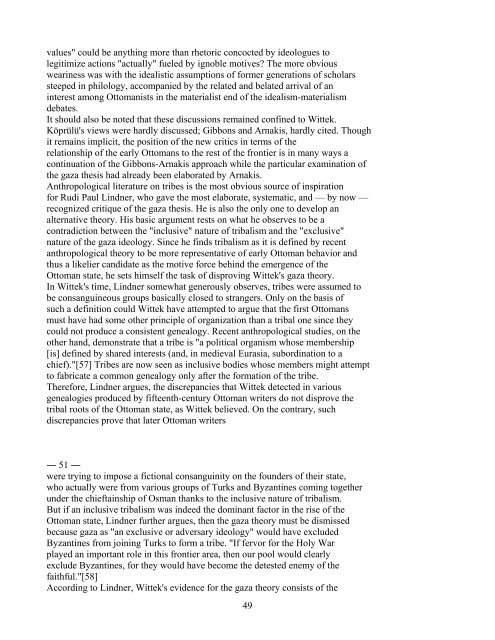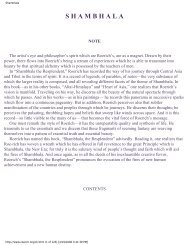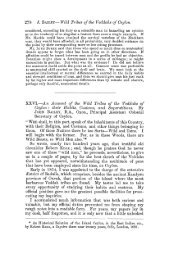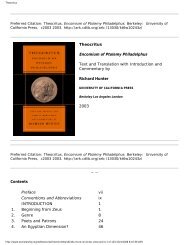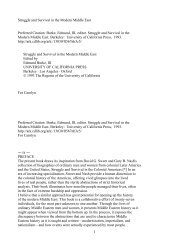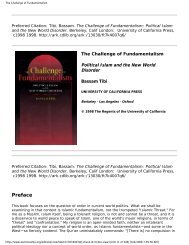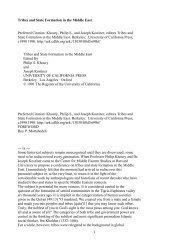Between Two Worlds Kafadar.pdf
Between Two Worlds Kafadar.pdf
Between Two Worlds Kafadar.pdf
You also want an ePaper? Increase the reach of your titles
YUMPU automatically turns print PDFs into web optimized ePapers that Google loves.
values" could be anything more than rhetoric concocted by ideologues to<br />
legitimize actions "actually" fueled by ignoble motives? The more obvious<br />
weariness was with the idealistic assumptions of former generations of scholars<br />
steeped in philology, accompanied by the related and belated arrival of an<br />
interest among Ottomanists in the materialist end of the idealism-materialism<br />
debates.<br />
It should also be noted that these discussions remained confined to Wittek.<br />
Köprülü's views were hardly discussed; Gibbons and Arnakis, hardly cited. Though<br />
it remains implicit, the position of the new critics in terms of the<br />
relationship of the early Ottomans to the rest of the frontier is in many ways a<br />
continuation of the Gibbons-Arnakis approach while the particular examination of<br />
the gaza thesis had already been elaborated by Arnakis.<br />
Anthropological literature on tribes is the most obvious source of inspiration<br />
for Rudi Paul Lindner, who gave the most elaborate, systematic, and — by now —<br />
recognized critique of the gaza thesis. He is also the only one to develop an<br />
alternative theory. His basic argument rests on what he observes to be a<br />
contradiction between the "inclusive" nature of tribalism and the "exclusive"<br />
nature of the gaza ideology. Since he finds tribalism as it is defined by recent<br />
anthropological theory to be more representative of early Ottoman behavior and<br />
thus a likelier candidate as the motive force behind the emergence of the<br />
Ottoman state, he sets himself the task of disproving Wittek's gaza theory.<br />
In Wittek's time, Lindner somewhat generously observes, tribes were assumed to<br />
be consanguineous groups basically closed to strangers. Only on the basis of<br />
such a definition could Wittek have attempted to argue that the first Ottomans<br />
must have had some other principle of organization than a tribal one since they<br />
could not produce a consistent genealogy. Recent anthropological studies, on the<br />
other hand, demonstrate that a tribe is "a political organism whose membership<br />
[is] defined by shared interests (and, in medieval Eurasia, subordination to a<br />
chief)."[57] Tribes are now seen as inclusive bodies whose members might attempt<br />
to fabricate a common genealogy only after the formation of the tribe.<br />
Therefore, Lindner argues, the discrepancies that Wittek detected in various<br />
genealogies produced by fifteenth-century Ottoman writers do not disprove the<br />
tribal roots of the Ottoman state, as Wittek believed. On the contrary, such<br />
discrepancies prove that later Ottoman writers<br />
― 51 ―<br />
were trying to impose a fictional consanguinity on the founders of their state,<br />
who actually were from various groups of Turks and Byzantines coming together<br />
under the chieftainship of Osman thanks to the inclusive nature of tribalism.<br />
But if an inclusive tribalism was indeed the dominant factor in the rise of the<br />
Ottoman state, Lindner further argues, then the gaza theory must be dismissed<br />
because gaza as "an exclusive or adversary ideology" would have excluded<br />
Byzantines from joining Turks to form a tribe. "If fervor for the Holy War<br />
played an important role in this frontier area, then our pool would clearly<br />
exclude Byzantines, for they would have become the detested enemy of the<br />
faithful."[58]<br />
According to Lindner, Wittek's evidence for the gaza theory consists of the<br />
49


